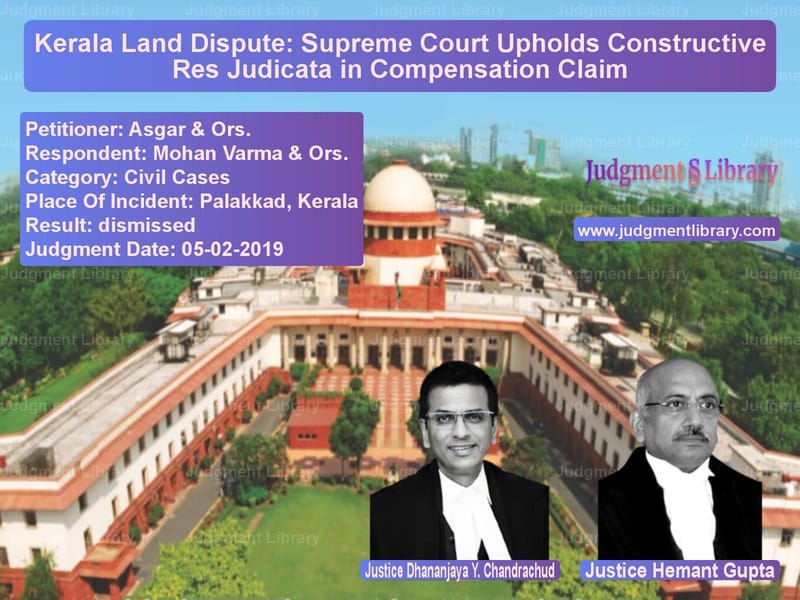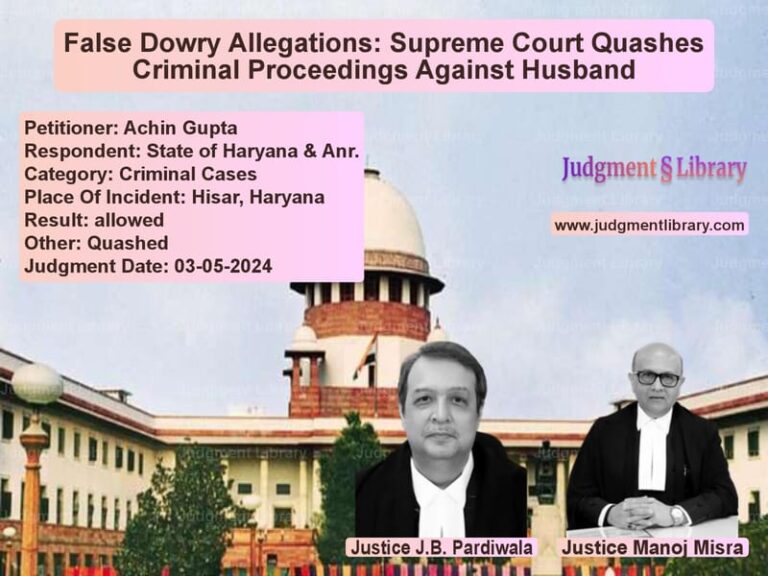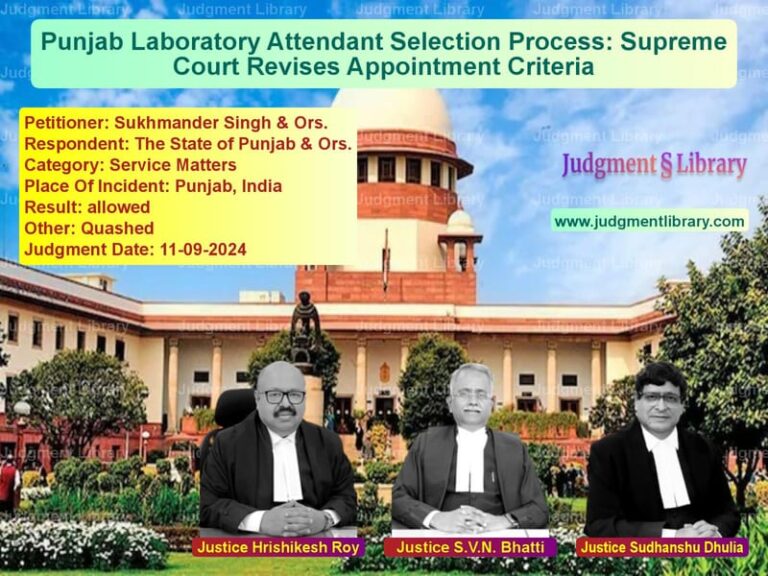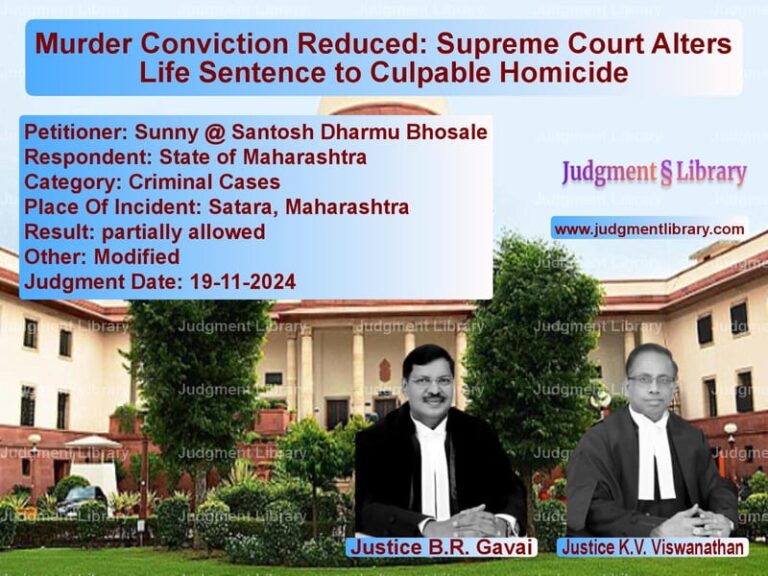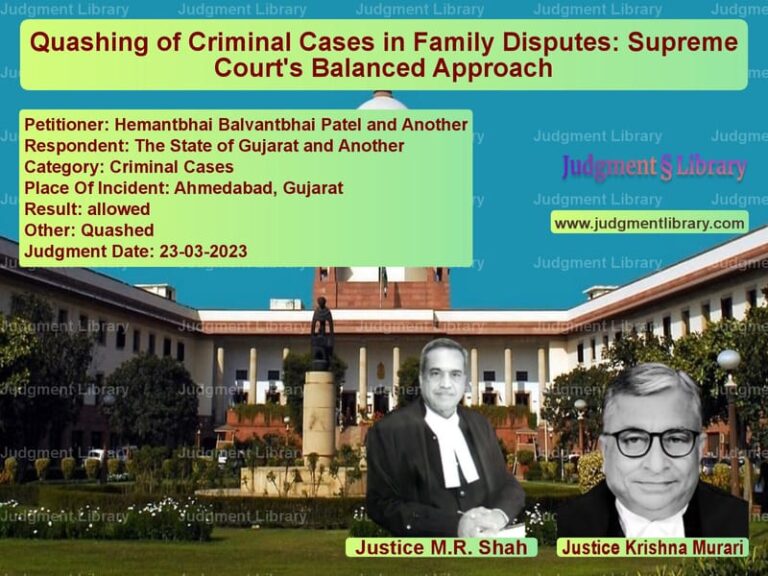Kerala Land Dispute: Supreme Court Upholds Constructive Res Judicata in Compensation Claim
The Supreme Court of India recently delivered a critical judgment in the case of Asgar & Ors. vs. Mohan Varma & Ors., addressing the application of constructive res judicata in a dispute over land possession and compensation under the Kerala Compensation for Tenants Improvements Act, 1958. The case revolved around whether a group of tenants could claim compensation for improvements made to the land after failing to raise the issue in previous litigation.
Background of the Case
The dispute originated over a large plantation property in Kerala, initially owned by the Vengunadu Kovilakam of Kollengode. Over the years, the land was leased and subsequently transferred to multiple parties, culminating in a complex litigation regarding possession rights and compensation claims.
A suit for partition was initially filed by the respondents before the District Judge, Palakkad, leading to a preliminary decree on 30 November 1965. Subsequent transactions saw the land being assigned to various entities, including the petitioners, who claimed to have made significant improvements to the land.
When the execution proceedings began for delivering possession to the respondents, the petitioners raised objections, asserting tenancy rights and demanding compensation under the Kerala Compensation for Tenants Improvements Act, 1958. However, their objections were dismissed by the Kerala High Court, leading to an appeal before the Supreme Court.
Key Issues Before the Supreme Court
- Whether the petitioners’ claim for compensation under the Kerala Compensation for Tenants Improvements Act, 1958, was barred by the principle of constructive res judicata.
- Whether the claim for compensation should have been raised in the earlier proceedings.
- Whether the petitioners, having been declared trespassers, could invoke the right to compensation for improvements.
Petitioners’ (Asgar & Ors.) Arguments
- The petitioners contended that their claim for compensation under the 1958 Act had not been adjudicated in the earlier proceedings and should be considered separately.
- They argued that the High Court’s previous decision only ruled on their tenancy claim and did not examine their right to compensation.
- They relied on the Supreme Court’s earlier order, which permitted them to pursue an appropriate remedy for compensation.
- They asserted that compensation for improvements is a statutory right and should not be barred by procedural technicalities.
Respondents’ (Mohan Varma & Ors.) Arguments
- The respondents argued that the petitioners had already litigated their right to possession and had been declared unauthorized occupants.
- They contended that under the principle of constructive res judicata, the petitioners should have raised their claim for compensation in the previous proceedings.
- They asserted that the petitioners’ failure to claim compensation earlier demonstrated a lack of bona fide intent and amounted to an abuse of process.
- They pointed out that the petitioners’ claim relied on a lease that had expired decades ago, making their continued possession illegal.
Supreme Court’s Observations
The Supreme Court thoroughly examined the provisions of the Kerala Compensation for Tenants Improvements Act, 1958, and the doctrine of constructive res judicata. The Court made key observations:
“The fundamental policy of the law is that there must be finality to litigation. Multiplicity of litigation enures to the benefit, unfortunately for the decree holder, of those who seek to delay the fruits of a decree reaching those to whom the decree is meant.”
“A matter which might and ought to have been advanced in a previous suit would be deemed to be directly and substantially in issue.”
Key Findings of the Supreme Court
- The Supreme Court ruled that the petitioners’ claim for compensation was barred by constructive res judicata.
- The Court held that the claim should have been raised in the earlier proceedings when the petitioners contested possession rights.
- The judgment emphasized that courts must ensure litigation finality to prevent misuse of legal remedies.
- The Court rejected the petitioners’ contention that compensation for improvements is an independent statutory right, stating that such claims must be raised at the appropriate stage.
Impact of the Judgment
The ruling has significant implications for property disputes and litigation under the Kerala Compensation for Tenants Improvements Act, 1958:
- It reaffirms the principle that claims must be raised at the appropriate stage in legal proceedings.
- It limits the ability of tenants or unauthorized occupants to seek compensation after losing possession claims.
- It clarifies that courts will not entertain fresh claims that could have been raised in previous litigation.
Conclusion
The Supreme Court’s decision in Asgar & Ors. vs. Mohan Varma & Ors. reinforces the doctrine of constructive res judicata and underscores the importance of procedural diligence in legal disputes. By barring the petitioners from raising a compensation claim after failing to assert it in earlier proceedings, the Court ensured that legal remedies are not misused to prolong litigation. This judgment sets a crucial precedent for future cases involving land disputes and compensation claims under statutory tenancy laws.
Petitioner Name: Asgar & Ors..Respondent Name: Mohan Varma & Ors..Judgment By: Justice Dhananjaya Y. Chandrachud, Justice Hemant Gupta.Place Of Incident: Palakkad, Kerala.Judgment Date: 05-02-2019.
Don’t miss out on the full details! Download the complete judgment in PDF format below and gain valuable insights instantly!
Download Judgment: Asgar & Ors. vs Mohan Varma & Ors. Supreme Court of India Judgment Dated 05-02-2019.pdf
Direct Downlaod Judgment: Direct downlaod this Judgment
See all petitions in Property Disputes
See all petitions in Succession and Wills
See all petitions in Contract Disputes
See all petitions in Judgment by Dhananjaya Y Chandrachud
See all petitions in Judgment by Hemant Gupta
See all petitions in dismissed
See all petitions in supreme court of India judgments February 2019
See all petitions in 2019 judgments
See all posts in Civil Cases Category
See all allowed petitions in Civil Cases Category
See all Dismissed petitions in Civil Cases Category
See all partially allowed petitions in Civil Cases Category

